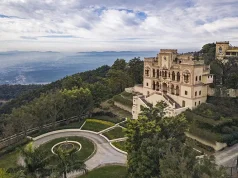In recent years, the travel and hospitality industry has experienced a dramatic shift. Travelers are becoming more discerning, with a growing preference for eco-friendly and sustainable experiences. One of the most significant trends in luxury travel today is the integration of sustainability into high-end accommodations, services, and amenities. This shift not only reflects a broader global awareness about the environment but also aligns with the evolving desires of affluent travelers seeking luxury that aligns with their values. Whether it’s opting for fiberglass-free mattresses in hotel rooms or choosing eco-conscious resorts, sustainability is now shaping the future of luxury travel.

The Rise of Sustainable Luxury Travel
Luxury travel has traditionally been associated with indulgence, comfort, and exclusivity. However, today’s luxury travelers are no longer solely focused on opulence but are also increasingly considering a destination’s environmental impact and social responsibility. This shift is partially due to a growing recognition of climate change, resource depletion, and the need for more responsible tourism.
Hotels, resorts, and other hospitality providers have begun to respond to this demand by incorporating sustainable practices into their operations. From eco-friendly building materials to offering locally sourced, organic food, sustainability is becoming a key pillar in luxury travel.
Moreover, as travelers continue to prioritize green initiatives, luxury accommodations are also turning their attention to the materials used in their rooms. For instance, the demand for healthier, eco-conscious options has led many hotels to replace conventional, potentially harmful items like traditional mattresses with environmentally friendly alternatives. Fiberglass-free mattresses are one such example, gaining popularity due to their non-toxic construction and minimal environmental impact.
Eco-Friendly Accommodations
As the luxury travel market becomes more sustainability-driven, high-end accommodations are leading the charge. Many luxury hotels are adopting green certifications, such as LEED (Leadership in Energy and Environmental Design), and incorporating green technologies into their design and operations. These hotels often focus on energy efficiency, water conservation, and waste reduction, and some even utilize renewable energy sources such as solar or wind power.
For travelers, eco-friendly accommodations offer not just a lower environmental impact but also a sense of comfort and well-being. Features like energy-efficient lighting, water-saving showerheads, and the use of organic toiletries all contribute to a more sustainable, yet luxurious, experience. Additionally, many of these properties are committed to using sustainable materials in their décor and furnishings, with some even opting for biodegradable or recyclable products.
For example, many luxury hotels now offer “green rooms” or sustainable suites that use natural, non-toxic materials. These rooms often feature organic cotton linens, sustainable wood furniture, and low-impact flooring, creating an eco-conscious, luxurious environment. Even the furniture is chosen with sustainability in mind—fiberglass-free mattresses, for example, are being selected for their non-toxic properties and long-lasting quality.
Sustainable Dining and Local Sourcing
Another area where sustainability is playing a crucial role is in the dining options offered at luxury hotels and resorts. Today’s luxury travelers want to enjoy high-quality, gourmet meals that are not only delicious but also ethical. This has prompted many high-end accommodations to emphasize locally sourced ingredients, organic farming, and sustainable seafood options.
Restaurants within luxury hotels are increasingly focusing on farm-to-table dining, offering dishes prepared with locally grown produce and responsibly sourced meats and seafood. This approach not only supports local farmers and communities but also reduces the carbon footprint associated with importing food from distant locations. Additionally, some resorts even grow their own organic produce on-site, giving guests the opportunity to enjoy food that is both fresh and sustainable.
Wellness and Sustainability
The wellness tourism sector has also seen significant growth in recent years, with travelers seeking not only relaxation and rejuvenation but also wellness experiences that promote health, mindfulness, and sustainability. Many luxury resorts are now offering eco-conscious wellness programs, such as organic spa treatments, yoga retreats, and nature-based therapies, designed to restore both the body and the planet.
Sustainable wellness practices are being incorporated into many luxury spa experiences, with hotels offering treatments that use organic oils, locally sourced herbs, and natural ingredients. Furthermore, some wellness retreats are making efforts to reduce their environmental impact by offering zero-waste practices, such as eliminating plastic packaging and using biodegradable materials.
Sustainable Luxury Transportation
Sustainability is not only affecting accommodations but also transforming how luxury travelers get from one place to another. In response to growing concerns over the environmental impact of travel, many luxury travel providers are introducing more sustainable transportation options. Electric vehicles (EVs), hybrid cars, and even eco-friendly private jets are becoming more popular among high-end travelers who want to minimize their carbon footprint without sacrificing comfort or convenience.
Some luxury resorts are now offering guests electric car rentals or shuttle services, while others are opting for sustainable modes of transportation, such as electric bicycles and solar-powered boats. These efforts provide a unique way for travelers to enjoy luxury while still contributing to a more sustainable planet.
The Future of Sustainable Luxury Travel
As sustainability continues to grow in importance, the future of luxury travel looks set to evolve. Eco-consciousness is no longer a niche interest; it has become a mainstream trend that is shaping the way people travel, especially in the luxury sector. Hotels, resorts, and travel providers are responding to this demand by adopting more sustainable practices, from using eco-friendly materials like fiberglass-free mattresses to reducing waste and energy consumption.
As travelers become more educated about the environmental impact of their choices, they will increasingly prioritize destinations and accommodations that align with their values. For the luxury hospitality industry, this means that sustainability will remain a key differentiator, driving innovation and setting new standards for what luxury travel can—and should—look like in the future.
Conclusion
Sustainability in the luxury travel sector is no longer just a passing trend; it’s a fundamental shift that is reshaping the entire hospitality industry. From eco-friendly accommodations and locally sourced dining to wellness retreats and sustainable transportation, high-end travelers are increasingly seeking experiences that align with their environmental values. As this trend continues to grow, sustainability will play an even larger role in shaping the future of luxury travel, ensuring that indulgence and eco-consciousness can coexist harmoniously. For today’s luxury travelers, the most luxurious experience is one that leaves a positive impact on both the planet and their personal well-being.





